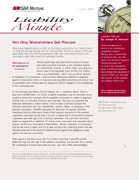Liability Minute: Not Only Shareholders Get Pierced
Omittance is no quittance. — Shakespeare
How many lawyers assist a client in forming a corporation, but merely assist in filing the annual reports and do nothing else? Failure to advise of the risk associated with this minimal approach may now more likely result in veil-piercing to reach the client for individual liability.
 By Joseph R. Marconi1
By Joseph R. Marconi1
Illinois courts have long held that the failure to follow corporate procedure may lead to the individual liability of a shareholder, director, or officer. Now, according to a recent case in the Appellate Court for the First District, even a non-shareholder — who is not an officer, director, or employee of a corporation — may be found individually liable for a judgment against a corporation where he exercises only equitable ownership and control over a corporation, even if there were no allegations that he engaged in any wrongdoing in the underlying case.
In John Buckley and Mama Grimm’s Bakery, Inc. v. Haithham Abuzir, 2014 IL App (1st) 130469 (April 10, 2014), a bakery corporation and its individual owner sought to pierce the corporate veil of a pastries corporation to collect a judgment directly from its individual financier and controller. The trial court granted the individual defendant’s motion section 2-615 motion to dismiss because the individual defendant was not a shareholder, director, officer, or employee of the pastries corporation. Plaintiffs appealed the dismissal. On appeal, plaintiffs maintained that the defendant made all the business decisions for the pastries corporation and exercised control over it to such a degree that it amounted to a dummy corporation and alter ego of the individual defendant. The individual defendant made two arguments in defense: (1) Illinois courts only pierce the corporate veil to impose liability on a corporation’s shareholders, officers, directors, or employees, and he was none of these; and (2) he was not party to the underlying action and was therefore deprived of the ability to defend himself against the allegations made against the pastries corporation.
With regard to the latter issue, the First District held that if plaintiffs proved defendant was the alter ego of the pastries corporation, the decision not to defend the underlying suit would have been his own, ipso facto. After acknowledging that the courts and commenters around the country were split on the issue of whether the corporate veil may be pierced to reach non-shareholders and/or those individuals lacking a corporate title at all, the Mama Grimm’s court determined that the majority of jurisdictions have held that a defendant’s lack of shares or corporate title does not preclude veil-piercing. Relying on Fontana v. TLD Builders, 362 Ill. App. 3d 491 (2d 2005), the Mama Grimm’s court further stated that Illinois falls in line with that majority and held that equitable ownership as pleaded by Mama Grimm’s may satisfy the unity-of-interest-and-ownership prong for piercing the corporate the veil, regardless of whether an individual is a non-shareholder or lacks any other formal title within the corporation.
This case clarifies a previously muddy area of Illinois law and requires that closely held corporations undertake every effort to maintain the corporate form. Lawyers should stress to their clients the importance of adequate capitalization, issuance of stock, election of a board of directors, recording of meeting minutes, and other corporate formalities. The simple formation of a corporation is not enough for individual clients to avoid personal liability, even if the individual is not a shareholder, director, or officer of the corporation.
[1] Joe Marconi is a shareholder of Johnson & Bell, Ltd., the head of the Business Litigation/Transactions group and co-chair of the Employment group. He gratefully acknowledges the assistance of Johnson & Bell, Ltd. associate, Brian C. Langs, for the research and drafting of this article.

